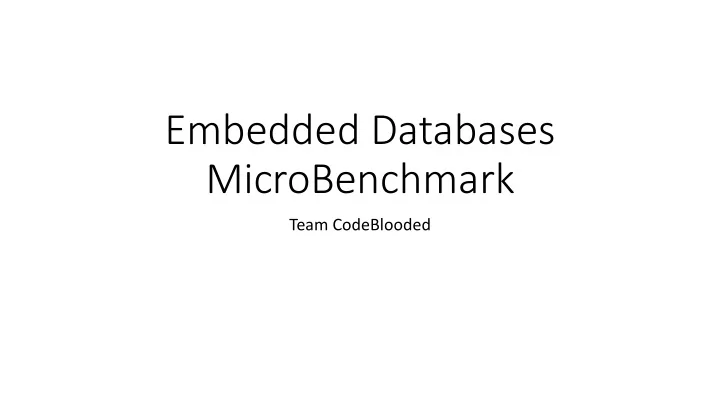

Embedded Databases MicroBenchmark Team CodeBlooded
Refinement of goals • Try and understand the usefulness of a DB in terms of a particular application domain • Goal : Build a DB calculator that works with the micro-benchmark • Embedded devices and the internet of things • Version control • Websites • Data analysis • Internal or temporary databases (Joins etc)
Understanding the Databases • Each claims to be the fastest • Each claims to have the smallest footprint • Each claim to be cross platform • No one compares themselves to every other databse • How do they differ in terms of features?
Feature comparison • -SqlLite and H2 are the only ones that support any other indexing other than B-/B+ • Derby, Berkeley and HSQLDB do not • -HSQLDB does support merge joins others do not (Derby claims it does) • -SQLLite only Left outer join • -Derby supports cursors others do not
Future tests (Things to include in our Benchmark) • Complex queries : Inner and outer joins, subqueries, read only views and inline views (Performance) • ORDER BY, GROUP BY, HAVING, UNION, LIMIT, TOP • Concurrency Test • Uses a small number of database files (Comparison) • Idle time resource use/usefulness • Performance when a database is NOT at capacity (Metrics : Time, CPU use)
Throughput vs threads Throughput vs Threads 2500 2000 1500 Throughput Derby H2 hsql 1000 sqlite MongoDb 500 0 0 2 4 6 8 10 12 Threads
Achieved vs target throughput 3000 2500 Achieved Throughput 2000 MongoDB 1500 h2 hsql derby 1000 sqlite 500 0 0 2000 4000 6000 8000 10000 12000 Target throughput
Overall Runtime vs throughput 9000 8000 7000 6000 sqlite runtime 5000 derby 4000 h2 hsql 3000 mongodb 2000 1000 0 0 2000 4000 6000 8000 10000 12000 throughput
Overall Runtime vs threads 16000 14000 12000 10000 Runtime(ms) MongoDb 8000 h2 hsql 6000 derby sqlite 4000 2000 0 0 2 4 6 8 10 12 threads
Analysis SqlLite closes and opens database files and invalidates cache for each transaction. Running multiple sql in single transaction is faster. Fsync is called after every transaction to put changes on disk, where H2 batches the changes. SqlLite waits idle for disk I/O to complete.
Lightweight Runtimes Team Sparkle Dhinesh Shiva Keno Guru
Next Steps ● Study behaviour under memory pressure ● Java and GC effects on Galileo ● Characterize specific workloads we want to support ○ rapid inserts ○ rapid queries ○ range queries ● Find bottlenecks in current implementations ● Benchmark streaming data eg. light sensor from phone
32-bit JVM Comparison Galileo Host TPCH-1 on a 10MB dataset
32-bit JVM Comparison With Increasing Dataset Sizes ● Working on it ● Have plots from host ● Been running since Wednesday ● Galileo - 1hr/query ( --repeat 10 )
Simulating Intended Workload ● Set up server to collect data ● Writing app to stream light sensor data to Galileo ● Plans to add 1-2 more sensors for rich time-range queries
Interpretation of the hprof info For the TPCH-3 query on a 30MB dataset, we found the top entries to be: 5.39% 5.39% 3404 300603 sun.util.calendar.BaseCalendar.getCalendarDateFromFixedDate ● ● 2.82% 8.21% 1780 300460 java.lang.Character.digit ● 2.79% 11.00% 1761 300383 java.lang.AbstractStringBuilder.append ● 2.43% 13.44% 1536 300593 java.lang.Character.digit ● 2.41% 15.85% 1521 300438 java.util.HashMap.hash ● 2.21% 18.06% 1393 300475 java.lang.String.<init> ● 2.19% 20.25% 1385 300477 java.util.Arrays.copyOf ● 2.19% 22.44% 1379 300606 sun.util.calendar.BaseCalendar.getFixedDate ● 2.17% 24.60% 1367 300479 edu.buffalo.cse562.DTO.Datum.<init> ● 2.17% 26.77% 1367 300627 sun.util.calendar.Gregorian$Date.<init> ● 1.89% 28.66% 1192 300667 sun.util.calendar.BaseCalendar.normalizeMonth ● 1.78% 30.44% 1123 300480 java.io.BufferedReader.readLine ● 1.75% 32.19% 1104 300490 net.sf.jsqlparser.schema.Column.getWholeColumnName ● 1.69% 33.88% 1068 300451 sun.nio.cs.US_ASCII$Decoder.decodeArrayLoop ● 1.68% 35.56% 1062 300441 java.lang.String.<init> o can be traced directly to our code o external activities
Next Steps ● Getting a full-fledged dataset (from our service) ● Characterizing insertion patterns ● Managing indexes (if any) ● Storage - Memory and Disk ● Characterizing query patterns
LLVM Query Runtime VALKyrie Ladan Arindam Vinayak Kaushik
Progress - Pros and Cons of different approaches of generating IR - More on benchmarking (if we have time)
Ways to generate IR - LLVM-J - Pros: - It is in Java - Cons: - We couldn’t get it running - Lack of documentation - Based on older version of LLVM - Abandoned about a year ago
Ways to generate IR - Java IR builder - Pros: - It is in Java - Simple to use API - We could generate IR - Cons: - We could not run the generated IR - Based on older version of LLVM (3 years ago) - No documentation at all.
Ways to generate IR - Python bindings - llvmpy / llvmlite - Pros: - Pythonic!!! - llvmlite pretty simple - Cons: - llvmpy too bloated, bad performance and abandoned - llvmlite unstable API, development driven by Numba
Ways to generate IR - C++ IR builder - Pros: - Enough documentation for start - The most complete approach - Based on the latest version of LLVM - We could generate IR and run it - Cons: - It is C++!!!
Our Challenges this week - Integrating our CSE562 code with C++ - Integrating C++ and LLVM generator code. - So we can read the tuples by C++ and bring them to memory - Use LLVM just for optimization
Design Decisions - Parsing and optimizing using existing Java Implementation - Dump the results in an easy to parse format (e.g. Json) - Use C++ IR-Builder for generating IR
Benchmark discussion
PocketData Benchmark Naveen,1Sankar,1Saravanan,1Sathish
What1did1we1do1last1week? • Started1extracting1data1from1phone1log. • 93b46e40acbf1167ab0ad421b73761f16b74b562 1426486358667 1426486358667.0 2015J03J161 06:12:38.667574 13274 13274 I SQLiteJQueryJPhoneLab {"Counter":0,"LogFormat":"1.0", "AppName":"Google-Play- Books" ,"Action":" APP_NAME ","PackageName":"com.google.android.apps.books"} • 93b46e40acbf1167ab0ad421b73761f16b74b562 1426477052477 1426477052477.1 2015J03J161 03:37:32.477583 13274 13274 I SQLiteJQueryJPhoneLab {"Counter":561,"LogFormat":"1.0","Time":243698,"Arguments":"null","Results":"SELECT1value1FROM1ScheduledTaskProto ORDER1BY1sortingValue ASC,1insertionOrder ASC","Action":"SELECT","Rows returned":3} • {"Counter":27,"LogFormat":"1.0","Time":129375,"Results":"SQLiteProgram:1INSERT1INTO1 carriers(bearer,authtype,carrier_enabled,protocol,mmsproxy,roaming_protocol,numeric,mcc,type,mmsc,password,mvno_m atch_data,mvno_type,name,server,mnc,apn,user,mmsport)1VALUES1 (?,?,?,?,?,?,?,?,?,?,?,?,?,?,?,?,?,?,?)","Action":"INSERT", "Arguments(hashCoded)" :"0,J1,1231,2343,J 1630285132,2343,47743056,49679,J697368471,155249537,117478,0,0,1755004508,42,1537,1954370557,117478,1784,"} • {"Counter":5,"LogFormat":"1.0","Time":149843,"Arguments":"null","Results":" PRAGMA table_info(name)","Action":"SELECT","Rows returned":0}
How1did1we1parse1it? • Switched1to1Java1from1Python – Java1is1faster.1Need1to1parse1more1than1a1GB1 – Better1support1with1jsqlparser • Extracted1features1like1number1of1projected1 columns,1table1count1etc., – Made1use1of1jsqlparser visitor1pattern • Modified1jsqlparser to1allow1PRAGMA1and1 INSERT1or1REPLACE1queries1(for1future).
Challenges1faced • It1took13.51hours1to1parse1and1extract1log1files. • Future1:1To1run1parallel1for1users.
Challenges1[contd…] • Unable1to1find1app1names1for1321million1 queries. – Something1wrong1with1our1logic • Coming1up1with1features1without1data1 available.
Results
Next1week1plan • Play1around1with1the1extracted1data1to1come1 up1with1interesting1features. • Extract1more1features1from1the1log1files.
Recommend
More recommend